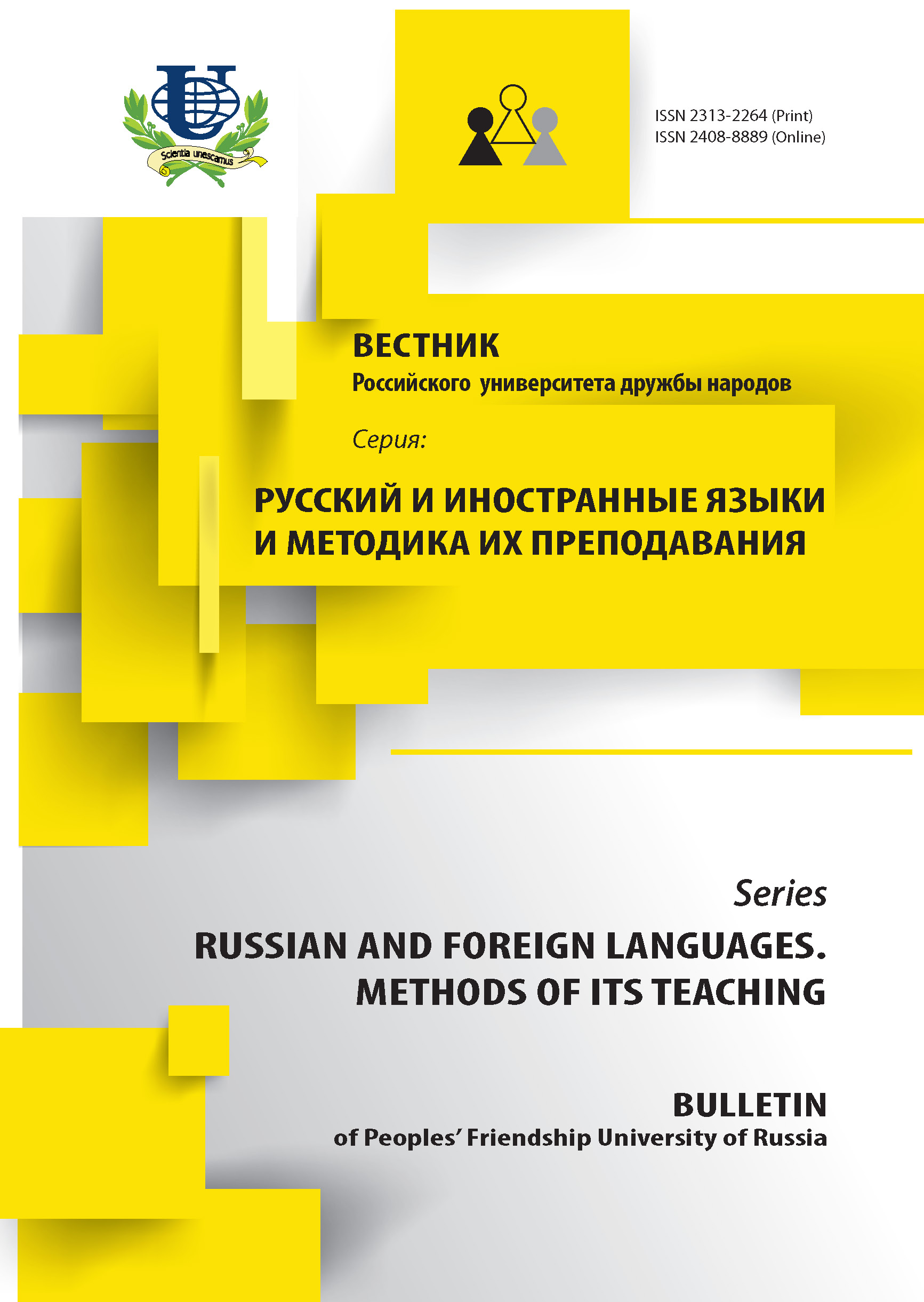No 4 (2013)
- Year: 2013
- Articles: 20
- URL: https://journals.rudn.ru/russian-language-studies/issue/view/624
Articles
 5-11
5-11


 12-19
12-19


Negative information detection and its impact on image in online-texts
Abstract
The article is devoted to the problems of speech image discredit on the Internet in connection with speech aggression strengthening in online texts. So it is necessary to accurately differentiate speech statements and information containing in them. The author presents an original systematization of speech image discredit types.
Russian Language Studies. 2013;(4):20-27
 20-27
20-27


Specific character of anecdote emotionality (on the materials of regional press of the mid-20th century)
Abstract
The article dwells on the category of the emotionality of anecdotes in regional press of the 20 th century. Emotionality is the capacity of a linguistic unit to express emotions of the characters of an anecdote. Specific emotive linguistic means, representing different emotions in the structure of an anecdote, create comic effect.
Russian Language Studies. 2013;(4):28-33
 28-33
28-33


Terms-eponyms in scientific language
Abstract
The article is devoted to the problem of using proper names in terminological systems of such sciences as philosophy, physics, chemistry, geology, etc. The author considers terms-eponyms, or eponymic names, which of different historical period, structure and meaning. The author recommends using terms-eponyms with relevant meanings for scientific purpose.
Russian Language Studies. 2013;(4):34-38
 34-38
34-38


 39-44
39-44


Ways of artistic argumentation in the artistic creativity of Tatiana Tolstaya
Abstract
The article deals with the peculiarities of argumentation in the artistic texts of Tatiana Tolstaya’s creative work including her symbolic argumentation. The writer uses different ways of argumentation in artistic social and political essays where four techniques of argumentation such as description, expressiveness, evaluation and orectic means dominate in the text. In all these cases the combination of the above mentioned ways of argumentation result in expressing conviction.
Russian Language Studies. 2013;(4):45-51
 45-51
45-51


Lexical and phraseological means of creating national and cultural dominant in N.S. Leskov’s short novels of 1870—1880
Abstract
The article characterizes short novels of N.S. Leskov written in 1870—1880. The article analyzes lexical and phraseological means of creating national and cultural dominance — native Russian vocabulary, set expressions, proverbs, sayings, aphorisms, idioms with the meaning of evaluation, metaphorization of set expressions. Thus we reveal the author’s intention.
Russian Language Studies. 2013;(4):52-60
 52-60
52-60


 61-71
61-71


 72-81
72-81


 82-87
82-87


Principles of interrelated learning in academic and sociocultural communicative spheres in teaching engineering students
Abstract
The main principles of interrelated learning in academic and sociocultural communicative spheres are represented, theoretically proved and the examples of their usage in teaching Russian as a second language to engineering students are given.
Russian Language Studies. 2013;(4):88-92
 88-92
88-92


Lexical gaps and culture specific vocabulary as a source of cultural information
Abstract
The article deals with some gaps in English and Russian languages which are revealed through comparative analysis, and states that culture specific vocabulary requires particular attention in foreign language teaching as it is a rich source of information about a target culture and language.
Russian Language Studies. 2013;(4):93-100
 93-100
93-100


Interaction of “foreign language” and professional disciplines teaching: higher school teacher’s experience
Abstract
The article dwells on the potential possibilities existing in the professionally directed approach of Foreign Language teaching which is viewed as a means of enhancing the professional business culture. The professionally oriented courses designed by the author (“Comparative Law”, “Corporate Social Responsibility”) and self-estimation tools of professional competence are described in the article.
Russian Language Studies. 2013;(4):101-105
 101-105
101-105


Succession of foreign language education at high technical school from the point of view of its quality evaluation
Abstract
In the article three kinds of succession (organizational and methodical, substantial, motivational and professional ones) in continuous education concerning foreign languages in the system “secondary school-high school” are presented. A model of efficient training in foreign languages at high technical school and knowledge estimation system predicting the knowledge level of every student on the basis of minimum initial data are suggested.
Russian Language Studies. 2013;(4):106-111
 106-111
106-111


The objectives of teaching french as a second foreign language in an innovative linguistic university
Abstract
The objectives of second foreign language teaching are to develop all the aspects of students’ communicative competence. A student’s personality is in the centre of the educational process. Modern methods of teaching foreign languages apply learner-centered approach. The task of foreign language teaching is to develop student’s personality and competence.
Russian Language Studies. 2013;(4):112-117
 112-117
112-117


On writing a textbook on russian as a foreign language for a technical university
Abstract
The article describes a new textbook for foreign students on the scientific speech style. The textbook was written jointly by Tatiana Timoshenko, Vadim Shuvalov (the Chair of the Russian language, NUST «MISIS») and Olga Ushakova (the Chair of Physical Metallurgy, NUST «MISIS»). The textbook includes 16 authentic texts on the Materials Science and Metallurgy. Each text is followed by a system of tasks, containing lexical, grammatical and communicative exercises. The exercises help foreign students to prepare for lectures and seminars on Materials Science and Metallurgy. A distinctive feature of the textbook is a system of problem-solving exercises.
Russian Language Studies. 2013;(4):118-123
 118-123
118-123


Textbook “We start to learn prepositions and conjunctions. Preposition, case and conjunctive constructions in speech”
Abstract
The article dwells upon a new textbook on Russian as a foreign language. The textbook aims at developing and training firm skills of understanding prepositional and case constructions and conjunctive sentences on the elemenatry level of studying Russian.
Russian Language Studies. 2013;(4):124-128
 124-128
124-128


Textbook «Insight into english syntax» in teaching grammar at higher school
Abstract
The article is devoted to the project of a textbook on the unit “Syntax” taken in the course of “Practical Grammar,” which is intended for the students of Linguistics. Presented exercises are various and are divided into reproductive to creative ones. The material is taken from the authentic audio-courses of VOA and BBC.
Russian Language Studies. 2013;(4):129-134
 129-134
129-134


Our authors
Russian Language Studies. 2013;(4):135-138
 135-138
135-138















